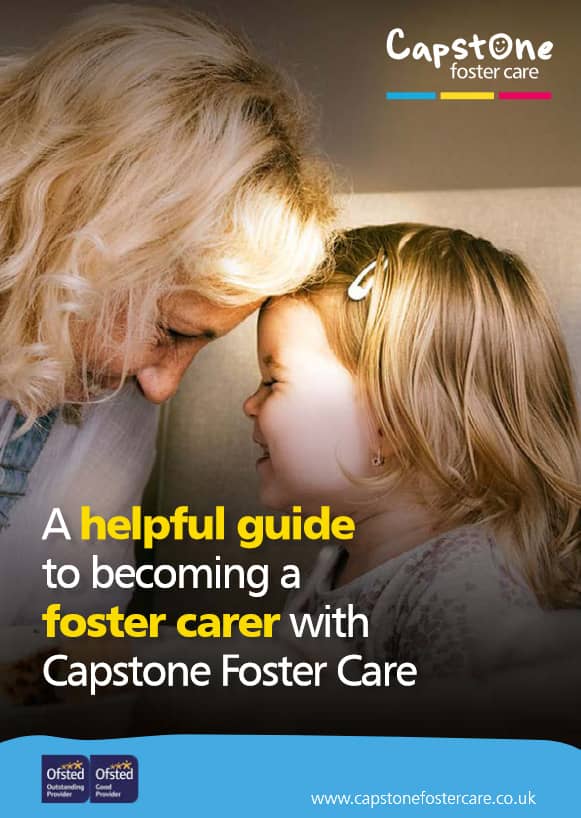


Fostering a disabled child
The role of an independent fostering agency
How to choose a foster care agency
Can I choose who I foster?
What are the benefits of fostering with an independent fostering agency?
What happens when a child is taken into care?
Fostering process: what happens on an initial home visit?
Fostering with local authority vs independent agency
A complete guide to becoming a foster carer
How Are Children in Foster Care Matched with Carers?
Foster Care Budgeting Tips
Becoming A Foster Carer
What is a Care Leaver?
What is a Foster Carer?
Fostering Regulations
How long does it take to become a Foster Carer?
What are the Foster Care requirements?
Changing IFA - Transferring to Capstone
8 reasons why a child may be taken into care
Fostering as a Career
Can you foster if you smoke or vape?
A guide to fostering assessments
LGBTQ+ Fostering
Equality, Inclusion & Anti-discriminatory Practice in Foster Care
What can disqualify you from foster care?
Can you foster if you’re on benefits?
Top transferable job skills to become a foster carer
Fostering as a same sex couple
Fostering while renting
Can you foster if you have mental health issues?
Is there an age limit for fostering in the UK?
Do foster carers get a pension?
How to foster a child: A step by step guide
How do DBS Checks Work?
Can I foster if...?
Mythbusting the top 10 Foster Care Myths
Can I foster if I am disabled?
LGBT Fostering Mythbusting
Can I foster if I have pets?
Can I Foster A Child?
Can I Foster and Work?
Can you Foster with a Criminal Record
Can Single People Foster?
LGBT Family and Foster Care
Fostering across Cultures
Muslim Fostering
Christian Foster Care
Sikh Fostering
Empty Nest Syndrome and Foster Care
Can I Foster?
What is the difference between residential care and foster care?
Fostering Babies and Young Children
What is Kinship Care?
Fostering Babies - Myths
Focusing on Parent & Child Fostering
Fostering Siblings
Fostering Teenagers
Fostering Teenagers - Breaking down the Myths
Fostering Unaccompanied and Asylum Seeking Children
Mother and Baby Foster Placements
Private Fostering
How does therapeutic fostering work?
Young Children Fostering Placements
Difference between short and long-term fostering
Types of self-harm
A Guide to the Foster Care Handbook
Reunification and Birth Parents: A Guide for Foster Carers
What is an EHC Plan? A Guide for Foster Carers
How to prepare a child for becoming a care leaver
Children who foster: impact of fostering on birth children
Fostering LGBTQ+ Youth
How to prepare your home for a foster child
How to help a lonely child: A Guide for Foster Carers
What are the National Minimum Standards for Fostering Services?
10 tips for foster children's education
How to prepare your foster child for secondary school
Tips for coping when foster placements end
Tips for foster parents during Coronavirus
What happens if foster parents get divorced?
5 ways to manage Mother's Day with foster children
Tips for managing foster children's bedtime routines
How to handle foster child bullying
Fostering allowances and the gender pay gap
What discounts can foster carers get?
How to adopt from Foster Care
5 ways to manage Father's Day for children in foster care
8 most common fostering challenges
FosterTalk Membership with Capstone Foster Care
Supporting foster children's contact with birth families
A guide to independent fostering
Keeping Children Safe Online: A Guide For Foster Carers
Movies About Foster Care
Play-based learning strategies for foster carers
A Guide to the Staying Put Program
Why Foster Parent Wellbeing Matters
How to deal with empty nest syndrome
How to recognise signs of depression in foster children
Can you take a foster child on holiday?
Tips and advice on fostering with a disability
10 tips on connecting with your Foster Child
Fostering vs Adoption - What's the difference?
How Fostering can change a future
How to adopt from Foster Care
How to encourage children to read in Foster Care
How to prepare a Foster Child's bedroom
Reading and Storytelling with Babies and Young Children
Supporting Children's Learning
The 20 most recommended books Foster Carers and young people should read
Things you can do when your children leave home
The impact of early childhood traumas on adolescence and adulthood
Anxious Disorders in Foster Children
What is sexual abuse and sexual violence
Foster Child behaviour management strategies
Foster Parent Advice: What to expect in your first year of fostering
Capstone's twelve tips at Christmas
10 celebrities who grew up in Foster Care
Could Millenials be the solution to the Foster Care crisis?
Do you work in Emergency Services?
Form F Assessor and Assessment Training
Foster Care Fortnight
Improving Children's Welfare - Celebrating Universal Children's Day
New Year - New Career - Become a Foster Carer
Young People Charities
Making sure every child is paired with a foster family that can provide them with the love and support they need is essential for a successful match. But what exactly is a foster care match? And how are matches decided? Our latest guide explains the foster care matching process.
Otherwise known as placing a foster child, matching is the process of finding the most appropriate foster carers for each child in care. Here at Capstone Foster Care, we prefer the term matching as opposed to placement as we believe it’s a more accurate term for considering both the needs of the child and the skills of the foster carer.
We always follow the foster care matching process to ensure the child is matched with carers who can meet their needs and circumstances. The only exception is for emergency fostering placements.
The first step of the foster care matching process is to assess the child’s needs. The main considerations that are assessed include;
Once the foster child’s needs have been outlined, the next step is to find the most suitable foster carer who is equipped to support the foster child’s unique needs and requirements.
Here at Capstone Foster Care, we take time to really get to know our foster carers, including their interests, skills and any gaps in their experience. Every foster child will have different priorities when it comes to their needs. However, the safety of the foster child is our utmost priority, which means if the child has any health needs, foster carers who can cater to this will be favoured. For example, if the child needs extra doctor or hospital appointments, foster carers who have the time and means to take them to their appointments will be preferable. Equally, if a child has religious or cultural needs then these are always prioritised.
Another key factor in the matching process is location. It’s important that the child’s time in foster care causes minimal disruption to their daily life as possible. Therefore, it’s important that the foster carer lives in a location that allows access to family time and school.
Finally, it’s not just the child’s needs that are important in the matching process. The chemistry between the foster carer and foster child helps to solidify a child’s place in the family, so our matching team make sure to take note of personality traits, hobbies, likes and dislikes. For example a child who loves playing outdoors will be matched with outdoorsy foster carers where possible and children who love animals, may be more likely to be matched with a family that has a pet.
One of the main challenges in the foster care matching process is the shortage of foster carers. There simply aren't enough foster carers, which makes it increasingly difficult to cater for the child’s individual needs. It can be especially difficult to match siblings, children with disabilities and teenagers due to the lack of foster carers with the time and skills needed to provide a safe, stable and loving home.
It can be difficult for foster children to settle into a new foster home, especially if they feel like being placed with a foster family is something that has been “done to them” rather than a process that they have been involved in. That’s why we send all our foster children a welcome book, which includes photos of their carers, their new home, bedroom and activities nearby that they can look forward to.
Fostering is a rewarding career, that not only develops your skills and experience, but ultimately, provides a safe and loving home for a child who needs one.
We fully support our foster carers in their fostering journey, which means our team are open and approachable if there are any worries before, during or after the matching process. We also provide training for all our carers and our MATTs service is also on hand to help if extra support is required. Could you foster? Make an enquiry today.
If you’ve got any questions or would like to find out more about fostering with Capstone, fill out the form below.
An experienced fostering advisor from your local area will then be in touch.

Start the conversation today. Our team of friendly advisors are on hand to answer any foster care questions you may have. We can offer you honest and practical advice that can help you decide if becoming a foster carer is the right path for you.


